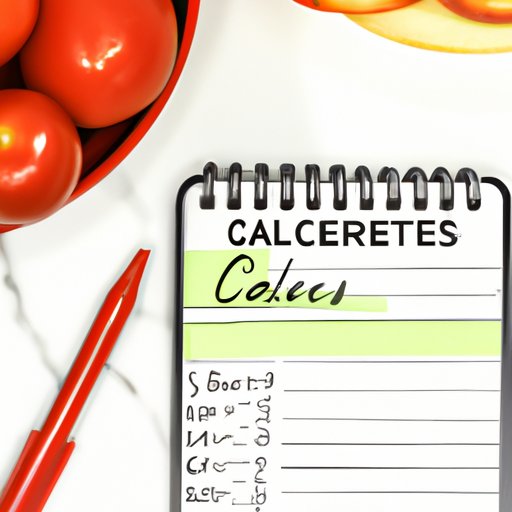
I. Introduction
Counting calories is an essential tool for anyone looking to lose weight. Understanding your calorie intake is crucial to achieving your weight loss goals while also maintaining a healthy lifestyle. In this article, we will explore key concepts related to calorie intake, including how many calories you need to lose weight, how to calculate your optimal calorie intake, the dangers of restricting calories too much, and tips for maintaining healthy calorie intake during weight loss.
II. The Relationship Between Calorie Intake and Weight Loss
Calories are essential for the body’s basic functions and provide us with energy for daily activities. However, consuming too many calories can lead to weight gain. To lose weight, it is necessary to create a calorie deficit, which means that you burn more calories than you consume. The extent to which you reduce your calorie intake can determine the rate of weight loss, but it is important to stay within a healthy range.
Generally, one pound of body fat contains around 3,500 calories. Therefore, to lose one pound per week, you need to create a calorie deficit of 500 calories per day. This can be achieved by reducing diet and increasing physical activity in combination.
III. How to Calculate Your Ideal Calorie Intake for Weight Loss
There are different methods for calculating your ideal calorie intake for weight loss. The most basic method is to multiply your body weight by 12 to 14 per day. However, this does not take into account your activity level, which means it may not be accurate for everyone.
The first step in calculating your ideal calorie intake for weight loss is to determine your basal metabolic rate (BMR), which is the amount of energy your body needs to maintain basic bodily functions such as breathing and circulation when at rest. There are various online calculators to help you calculate your BMR.
Once you have calculated your BMR, you need to factor in your activity level. People who are more active require more calories than those who are less active. For example, if you lead a sedentary lifestyle, you would multiply your BMR by 1.2. If you are moderately active, you would multiply your BMR by 1.55. Those who are highly active need to multiply their BMR by 1.9.
Finally, you need to adjust your calorie intake for your weight loss goals. To lose weight, you need to create a caloric deficit of 500 to 1,000 calories per day, which will result in 1-2 pounds of weight loss per week.
IV. The Dangers of Excessive Calorie Restriction and Crash Diets
While it is necessary to create a calorie deficit for weight loss, reducing calorie intake excessively can have negative consequences for your health. Extreme calorie restriction has been linked to a reduction in metabolic rate, leading to muscle loss, nutrient deficiencies, and fatigue.
Crash diets are another type of extreme calorie restriction that can be harmful to your health. They involve following a very low-calorie diet for a short period, typically 1-3 weeks, to achieve rapid weight loss. However, these types of diets are often nutritionally imbalanced and can lead to health complications, such as electrolyte imbalances, dehydration, and digestive issues.
Instead of focusing on extreme calorie reduction, it is essential to take a gradual approach to weight loss. A moderate calorie deficit, combined with regular physical activity and a balanced diet containing all essential nutrients, can lead to sustainable weight loss in the long term.
V. Tips for Maintaining Healthy Calorie Intake During Weight Loss
Managing calorie intake is essential for achieving and maintaining weight loss. However, it can be challenging to resist cravings and stick to a calorie-restricted diet. Here are some tips for managing calorie intake:
- Eat a variety of healthy foods to get all the nutrients your body needs.
- Control your portion sizes and use smaller plates to help you eat less.
- Eat slowly and mindfully, paying attention to your hunger levels and satiety signals.
- Reduce your intake of high-calorie foods such as processed foods, sugary drinks, and sweets.
In addition to these tips, meal timing and frequency can also impact calorie intake. Evidence suggests that maintaining a consistent meal pattern and avoiding eating too late at night can help manage calorie intake to promote weight loss.
VI. Meal Planning and Prepping for Effective Calorie Control
Meal planning and prepping are essential for maintaining healthy calorie intake during weight loss. Planning healthy, low-calorie meals in advance can help prevent overeating and reduce the likelihood of making unhealthy food choices.
Here are some tips for meal planning and prepping:
- Choose healthy recipes that are easy to prepare and store well.
- Prepare meals in advance and store them in the fridge or freezer for later use.
- Use a food scale to measure serving sizes and control portions.
- Incorporate healthy snacks such as fruits, veggies, and protein bars to ensure you have healthy options on hand.
VII. Conclusion
Counting calories is a crucial part of weight loss. Knowing how many calories you need to consume daily to achieve weight loss goals can make this process less daunting. However, it is essential to take a moderate approach to calorie reduction, avoid excessive calorie restriction, and nourish your body with all nutrients it needs. By following the tips outlined in this article, you can achieve your weight loss goals sustainably and healthily and ensure long-term weight management.





